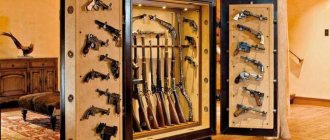Today, storing weapons at home raises many questions among both new hunters and hunters with ten years of experience. LRR employees also cannot always clearly explain their own requirements, because the rules may differ significantly in different departments. This means that it would be advisable to fully understand such a serious issue. How is it possible to store weapons at home? Do the requirements change every year or remain the same? What does this depend on? These and other equally interesting questions can be answered as you read the article.
General provisions
Is it possible to store weapons at home? The requirements and rules corresponding to this issue in relation to individuals are set out in the Law “On Weapons” of 1996 in Article 22 “Storage of service and civilian weapons, as well as ammunition for them.”
According to the standards for storing traumatic weapons, only citizens who have a special permit have the right to store them at home. It should be noted that weapons, the acquisition of which is possible without registration with the Department of Internal Affairs and a license, can be stored without documented permission. Thus, in certain cases, without registration and a license, it is still possible to organize the storage of weapons at home. The relevant types include the following:
- Specialized products whose design is similar to that of a weapon.
- Pistols and rifles with a muzzle energy of three joules, as well as air revolvers.
- Revolvers with a caliber of up to six millimeters, as well as cartridges for them.
- Signal pistols.
Rules for storing hunting weapons and ammunition in 2019
Weapons are considered high-risk items. Those who purchase such items should be aware that improper use of them leads to serious consequences: administrative and criminal liability.
The tougher measure is provided for by the legislation of the Russian Federation due to the fact that people may be injured during improper storage and use of a firearm. Measures have been developed for special storage. What are they?
Having a weapon for personal use (hunting, self-defense, on duty) is not legally prohibited, but compliance with the rules for storing hunting rifles and ammunition is enshrined at the state level.
Before purchasing a firearm, civilians undergo special training and after that receive permits - a license at the place of residence.
Basic provisions for the amulet of a hunting rifle
Storage rules are prescribed in the Law “On Weapons”. It reads:
- Special conditions are selected for storage so that the item is preserved and safe for others, and access to it by third parties is strictly limited.
- It is prohibited to keep weapons illegally; they must be immediately handed over to the authorities.
- The firearm, being in the appropriate place, should not fall into the hands of unauthorized citizens. Participants in sports shooting associations are allowed to place and store weapons and ammunition in shooting sports facilities during match competitions or training shooting ranges. In this case, sports buildings are equipped with alarm protection devices.
- When changing the registration address, a citizen must, within 2 weeks, report his new location to the department of internal affairs, where the weapon will be registered.
If you ignore the order, the citizen faces administrative liability.
What are the consequences of illegal possession of weapons?
The term “illegal storage” means the presence of weapons and their components in the space of the house, secluded places, hiding places.
Deliberate concealment of the following property without permits provides for criminal liability:
- Ammunition, cartridges;
- Explosives, gunpowder;
- Bombs, grenades, explosives.
The violator will be judged to the fullest extent of the law. Punishment may result in:
- Restriction of freedom;
- For forced labor;
- Arrest (up to six months);
- Imprisonment;
- Imposition of penalties.
Illegal caches of hunting shotguns or weapons of limited destruction are subject to administrative punishment. For concealing a hunting rifled barrel, you will have to answer under the Criminal Code.
Illegal storage of ammunition and various types of weapons is fraught with punishment for the violator from law enforcement officers. The degree of severity will be determined by the court. The following items are not subject to legal sanctions: signal equipment, gas pistols, and edged weapons.
Consequences of careless storage
The regulatory article of the Russian Criminal Code (224) speaks of dishonest storage of military equipment. This is especially true if they fall into the hands of citizens who have nothing to do with weapons, or if the possession of military items has led to a fatal outcome - the death of a person.
Types of punishment:
- The fine (its amount) will be the income for six months of the convicted person;
- Criminal punishment in the form of forced labor for the person who has stumbled; part of his earnings will be contributed to the state’s income (correctional labor);
- Punishment when the offender, during his free time from his main work activity, works for free in community service for 360 hours;
- A state special agency supervises the convicted person;
- According to the sentence, the convicted person is isolated from society for up to six months.
In case of an unlawful act resulting in the death of two or more persons, legal measures provide for:
- Correctional activities up to 24 months;
- Public labor (compulsory work) up to 480 hours;
- Forced isolation for up to two years.
Weapons not stored at the place of registration
If the user has purchased a defeat device, he must hide it in his place of residence, observing the conditions of safe storage. Access to a hunting rifle, if the item is not located at the actual residence address of the owner, must be limited to unauthorized persons.
If the owner of a firearm takes it with him for his needs - hunting, fishing, or other activities - he is obliged to carefully monitor his item.
If the holder of the gun does not live according to registration, then temporary registration at the new place of residence is necessary, the possession of the gun is reported to the police department and a certificate is obtained from the licensing and permitting department.
Violation of generally accepted norms for more than three months without permitting registration is fraught with the imposition of penalties. The weapon must be located where the owner lives.
Storing weapons at home: requirements
In accordance with the law, service and civilian weapons must be stored under circumstances that ensure the safety of their storage, safety, and also prevent access to them by unauthorized people. It should be noted that the requirements related to the storage conditions of various types of service and civilian weapons (and, accordingly, cartridges for them) are determined by the Government of the Russian Federation.
The above formulation is not very clear, it’s hard to argue with that. It is quite obvious that the specified conditions for storing weapons at home can only be ensured through round-the-clock security of barrels locked in a gun safe or metal cabinet. Why? For example, opening an unguarded safe today is only a matter of time, as well as the protection class of the storage facility. The world-famous “shell phenomenon” is quite relevant here: when the car is on the street, in order to hack the alarm system, the thief has extremely little time; when the car is in a “shell”, that is, in the garage, you have the opportunity to tinker with it without rushing, because, one way or another, no one will interfere. Thus, in reality, safe conditions for storing traumatic weapons at home are achieved exclusively by combining the use of security and a gun safe.
Specific requirements on this issue are spelled out in the decree of the Government of the Russian Federation dated July 21, 1998, in Chapter 59 regarding measures to regulate the circulation of service and civilian weapons, as well as cartridges for them on the territory of Russia. In addition to this legislative act, the analyzed problem is regulated by the Appendix to the order of the Ministry of Internal Affairs dated April 12, 1999 “Instructions for organizing the activities of internal affairs bodies affecting control over the circulation of service and civilian weapons, as well as ammunition for them on the territory of Russia.”
The concepts of “place of residence” and “place of temporary stay”
Before moving on to the conditions for storing weapons, let’s consider the question of what the concepts of “place of residence” and “place of temporary stay” mean.
.
It would seem that there is nothing complicated here, the place of residence is where we live: at home, in the country, in the village, in a purchased apartment or room.
But not everything is so simple here...
There is the Law of the Russian Federation dated June 25, 1993 No. 5242-1 “On the right of citizens of the Russian Federation to freedom of movement, choice of place of stay and residence within the Russian Federation.”
Article 2 of this law clearly defines the concepts that interest us.
Location
- a residential house, apartment, room, or other residential premises in which a citizen permanently or primarily resides as an owner or on other grounds, and
in which he is registered at the place of residence
.
Accordingly, opening the page in the passport that is entitled (place of residence) we look where we are registered - this is the place of residence, from the point of view of legislation.
Place of stay
- a hotel, sanatorium, holiday home, boarding house, camping, tourist base, medical organization or other similar institution, or residential premises that are not the place of residence of a citizen of the Russian Federation,
in which he resides temporarily
.
That is, when going on a trip or hunting, we stop for the night or for a longer time in places of temporary stay.
Depending on where our weapons are currently stored, the legislator has defined different requirements for storage conditions
.
These requirements and conditions are set out in Article 22 of the Federal Law “On Weapons” and the Rules approved by Decree of the Government of the Russian Federation of July 21, 1998 No. 814.
Information on legislation
The requirements characterizing the Law on the storage of hunting weapons at home suggest that weapons and cartridges that belong to Russian citizens must be stored in accordance with their place of residence and under conditions that can ensure the safety of storage, the safety of products, and also prevent access to them by unauthorized people . It is necessary to add that weapons and ammunition must be stored in safes or metal cabinets, locked with a key, or in high-strength boxes (for example, in wooden containers lined with iron). It is important to note that the department of internal affairs bodies corresponding to the owner’s place of residence is vested with the right to check weapons that were previously registered. In addition, the storage of the above products by Russian citizens in places of temporary stay is carried out according to the rules in compliance with conditions that, one way or another, exclude access to weapons and ammunition by unauthorized persons.
In accordance with the presented material, the requirements characterizing the storage of weapons at home, in fact, boil down to the presence of a durable box with a lock, which is located at the place of residence (but not registration) of the owner of the weapon. By the way, a metal cabinet of any system absolutely meets these requirements.
It should be noted that the most detailed requirements regarding the storage of weapons and ammunition for them are contained in one of the annexes of the order of the Ministry of Internal Affairs of the Russian Federation. It is in accordance with it that all activities of the licensing and permitting authority are carried out. Thus, the requirements for storing hunting weapons at home, equipping specialized rooms, warehouses, storage facilities, premises for displaying, displaying or selling weapons, as well as shooting ranges and shooting ranges are interpreted as follows:
- Citizens of Russia are required to store weapons and ammunition for them, in accordance with their place of residence, as well as places of stay, in special safes, metal cabinets that are locked with a key, or in high-strength boxes (for example, wooden containers lined with iron on all sides) .
- Then, when a citizen owns a collection of weapons, the storage room for the products must be equipped with a security and fire alarm. In addition, the requirements for storing hunting weapons at home require that the doorway of the corresponding room must have a metal entrance door with a frame and additional locks.
- The windows of an apartment or room located on the top or first floor of a building must additionally contain a metal grill installed in the manner prescribed for storage areas for weapons.
- Then, when installing an alarm is impossible, in accordance with technical reasons, boxes and cabinets for storing products must be secured to one of the walls of the room using steel bolts (at least two), the thread diameter of which is equal to or greater than sixteen millimeters.
The Long Barrel of Discord: How to Travel with a Weapon and Not Lose It
photo: Russian National Guard
On long trips, he took with him a carbine - a rifled Saiga-MK with a folding butt in caliber 7.62x39 mm.
I also know tourists who go hiking in impassable wilderness or go rafting and (in their words, of course) also “just in case” they stuff a shotgun into their backpack - in case there are bears, wolves...
Even among lawyers specializing in weapons issues, there is no consensus on how legal such actions are.
It is known that the state, represented by security forces and regulatory authorities, does not favor armed citizens too much and tries to narrow their legal framework as much as possible.
Therefore, traveling with a gun or carbine may well result in the owner being accused of violating storage rules or illegally carrying, and transporting weapons through forest lands is fraught with charges of poaching.
The result is an administrative protocol, courts, possibly a fine and even confiscation of the arsenal. Not much pleasant.
So I decided, with the help of experts, to figure out what trips you can take long-barreled weapons with you on, what risks arise when transporting weapons over long distances, and what you need to know when going on a trip.
The inspector arrived and took the gun
The first advice from the ex-head of the public organization “Right to Arms” (PNO) Igor Shmelev: you need to know the legislation regulating the transportation of firearms! Because law enforcement officials often interpret it quite loosely.
However, regarding the barrel, which is taken “just in case,” let’s make a reservation right away - carrying long-barreled firearms for self-defense is clearly prohibited by law. Dot.
Another question is that if the weapon is in a case, it is unloaded and the cartridges are located separately, then this is no longer carrying, but transportation.
| photo: Semina Mikhail |
It is over this operation that the spears break, because, according to weapons legislation expert Vasily Mazaev, there is no legal definition of what exactly constitutes transportation in the legislation. Federal rules for regulating the circulation of weapons determine only how this transportation should be carried out.
There is an explanation from the Ministry of Internal Affairs of the Russian Federation back in 2013 that transportation is the movement of weapons using a vehicle.
Representatives of the Russian Guard, giving comments to the press, emphasize that transportation is the transportation of weapons by the owner from one point where storage, carrying or use is permitted, to another.
Let's say, from home to a hunting place, to a shooting range, or to a place of temporary stay, for example, to a dacha. But you can’t just carry a gun in a car, even if you comply with all the regulations.
Moreover, you cannot leave it in the car - such actions, taking into account judicial practice, according to Mazaev, can be regarded as illegal storage.
It is completely unacceptable to take a weapon when going on a picnic or fishing: “They confiscate it because this is no longer transportation, this is illegal possession. They will write that you keep weapons in your car. There have been many cases where a person went hunting, did not take the gun out of the car, went fishing with it... An inspector arrived, drew up a report and took the gun.”
| photo: Semina Mikhail |
A possible way to avoid trouble when traveling with a gun in a car is to think through your route to the smallest detail, so that each point on the route can be explained if necessary: I’m going to a friend who wants to buy a gun from me, I need to show him; I’m going to the store to offer weapons for consignment; finally, I’m going to my mother-in-law or a friend’s for a week (this is a temporary place of stay), and I will have a gun.
Not all interlocutors agree with this approach.
“I traveled all over Russia with my weapons,” said Igor Shmelev. – It is my right to transport weapons on the basis of a federal permit. Neither the Weapons Law nor the government decree requires informing law enforcement and regulatory officials about where you are going!”
A lawyer dealing with civilian weapons issues, Muslim Sheikhov, holds a similar position. The purpose of traveling with a weapon, according to his version, can be anything: from “I’m going hunting” to “I’m afraid the weapon will be stolen from the apartment in my absence,” the main thing is that the transportation rules are not violated.
At the same time, we must remember that in a place of temporary stay, in the same hotel, a citizen carries out temporary storage of weapons and must, by law, ensure the safety of his arsenal.
I took a wrong turn
Troubles can happen when the owner of a weapon transports it across hunting grounds, even if he is driving on public roads. The presence and seriousness of this problem was recognized by all experts without exception.
And on thematic forums - weapons and hunting - there is often a discussion of this situation: you are following with your gun (in a case, unloaded) to a certain destination, but your path runs through land where you never thought of hunting.
Naturally, you do not have a permit, license or other documents confirming the right to hunt in this particular place.
The hunting inspector, sometimes with the police or traffic police (if the case happens on the road), checks your weapon, permits, and then issues a report of an administrative violation.
Sometimes a person with a gun is stopped for inspection near the railway platform and even on the platform itself.
“We are facing a problem,” explains Igor Shmelev. – On the one hand, the Law “On Weapons” and Government Decree No. 814 clearly prescribe the procedure for being with a weapon during a hunt: it is unsheathed, loaded, and a cartridge is sent into the chamber if necessary. If the weapon is sheathed, unloaded and the cartridges are separate, the weapon is transported. But the same law “On Hunting” equates any presence in the forest with hunting tools to hunting.”
| photo: Semina Mikhail |
In this case, law enforcement officers are very fond of initiating a poaching case, and the court, at least of the lower instance, most often sides with the prosecution.
According to Sheikhov, the Law “On Hunting”, in principle, gives too broad a definition of this process - as an activity related to the search, tracking, pursuit of hunting resources, etc.
Accordingly, simply following through the land can be interpreted as searching or tracking game. Unscrupulous officials take advantage of this.
Moreover, both lawyers and experienced hunters assure that it is extremely difficult to protect yourself from arbitrariness in such a situation.
“They are constantly fined, detained, even confiscated,” complained Mikhail Krechmar, editor-in-chief of the Russian Hunting Journal. – I proceed from the fact that any presence with a weapon on the territory of hunting grounds without hunting documents can, if desired, be equated to poaching. And then everything will depend on the individual judge. Because of this, I forgot how to drive with a weapon.”
Lawyers advise a citizen who has fallen into such a bind and against whom an illegal protocol is being drawn up not to refuse to sign it, but to be sure to indicate all the circumstances of the arrest - where, at what time.
Be sure to register your disagreement with the protocol, indicating the circumstances excluding the existence of an administrative offense, and demand delivery of a copy of the protocol in accordance with clause 6 of Art. 28.2 of the Code of Administrative Offences.
It would not be superfluous to photograph the inspection of the vehicle and the position of the person performing the inspection. Subsequently, all this will be useful for appealing the actions of the official.
Moreover, competent actions and legal knowledge of the “victim” can cool the ardor of the “inspectors”.
Armed tourists
A separate topic is the weapons of tourists. Just enter the phrase “gun for rafting”, “gun for hiking” or “expedition gun” into a search engine and several threads will pop up discussing which barrel is best to buy for hiking and water routes, how best to pack it and how to make sure going with a weapon did not have any unpleasant legal consequences for you.
The topic has been actively discussed for many years. On the forum, for example, a photograph of a prototype pump-action shotgun was recently presented, which participants in the discussion are positioning specifically as an expeditionary one...
In the 2000s, lovers of long-distance wanderings often preferred a family of strange and unsightly shotguns called “Lynx”.
In fact, this is a conversion version of a model called RMB-93 (a repeating combat rifle from 1993), which the Tula TsKIB SOO developed for employees of the Ministry of Internal Affairs. However, the security forces did not like this strange device, and it was released onto the civilian market.
Unlike the usual “pump”, the Lynx’s tubular magazine is located above, not under the barrel, the bolt is motionless, and the barrel moves back and forth, as if stretching over the fed cartridge.
Shooting from the Lynx is inconvenient, the ergonomics are below par, but at the time of its appearance it was the most compact civilian firearm, fitting perfectly into a backpack.
Unfortunately, our legislation does not provide for ordinary citizens the right to carry weapons for protection from wild animals, no matter what taiga wilderness you may be in.
| photo: Fotolia.com |
De jure, by government decree, only geologists are allowed to carry a long gun, and then not all, but only employees of the Ministry of Natural Resources. But expeditions are sent both from the Ministry of Construction and from private organizations performing contract work.
There are non-profit structures that search for people. Participants in such expeditions are sometimes forced to get out, almost breaking the law.
As Igor Shmelev said, when working in a geological party on Sakhalin or while searching for a person in North Ossetia, he had to take weapons with him, since the area is “very rich in wild aggressive animals.”
“If in the first case I could refer to the fact that I was an employee of the geological service, then in the second I carried a weapon with me, and local law enforcement officers turned a blind eye to this for the simple reason that they themselves took part in the search and knew that in those there are a lot of bears in places.”
This is the case when a gun or carbine is carried unsheathed on the shoulder. And if, as expected, you hide it and the cartridges separately... According to Vasily Mazaev, any journey on foot or rafting with a weapon is a violation, and there are such cases in judicial practice.
After all, everyone understands that in fact a person carries a gun/carbine with him precisely for the purpose of self-defense, and this, as stated above, is prohibited. Punishment up to and including confiscation is possible for illegal possession or carrying.
The citizen needs to convince law enforcement officers that this is transportation and that he is moving his gun from point A to point B. “He is traveling on a raft from the city of Biysk to the city of Barnaul and is carrying a weapon with him,” the expert sneers. “It’s in a case, unloaded, etc.”
But Muslim Sheikhov believes that this option of transporting weapons (in a tourist backpack) is completely legal, but warns that “there is a risk of encountering unscrupulous hunting inspectors.”
And, as we understand, there is a risk that it is possible to prove to law enforcement officers the legality of such transportation only with the help of a good lawyer.
Draw bars on the windows and get used to it
In general, even in the gun community, there is no consensus yet on whether travelers and tourists should be allowed to carry guns and carbines for self-defense. Many hunters view this as direct assistance to poachers - they will be the first to take advantage of this opportunity.
Igor Shmelev believes that confirmation of hunting (legal or not) is not weapons, but prey - if a person does not have prey, it means he did not hunt.
On the other hand, the problem could be solved by introducing certain categories of self-defense weapons, for example, revolvers and pistols - this is what Right to Arms advocates for.
Hunting with a short barrel is very problematic, but at the same time, according to our interlocutor, there are positive statistics on the use of such weapons “even against large bears such as grizzlies.”
“I worked in the Khabarovsk Territory in the 90s and know cases of using TT pistols and revolvers against bears with successful results,” says Shmelev. “Plus, for self-defense, a pistol is somewhat more convenient than a shotgun.”
“I'm not sure whether travelers should be allowed to carry weapons. – argues Mikhail Kretschmar. – From whom do you need weapons for self-defense? From people? Then immediately draw bars on your windows and get used to it. A weapon will not help you against a bear that attacks you in the forest. If a bear is going to eat you, he will eat you - he is smarter than you, he is on his territory, everything is fine with him.”
| photo: Semina Mikhail |
On the other hand, any experienced gun owner knows perfectly well that an armed person who does not have proper practice can pose a much greater danger to others and to himself than an unarmed person.
Violation log
A frequent, but absolutely illegal situation that citizens face when transporting firearms is the recording of personal data during document verification.
Enter the subway with a weapon, the metal detector rings, a police officer appears and asks you to go with him to check the number of the weapon and the ROH permit. At the same time, he carefully copies your passport data into some journal.
“The Law “On Personal Data” does not provide for the registration of personal data of weapon owners when they are in the common area of transport infrastructure facilities,” Igor Shmelev is sure. – It is not known where they record it, where it will all end up and how it will be used. They don’t know it themselves and can’t explain it.”
Lawyer Muslim Sheikhov reminds that the collection and processing of data in the absence of written consent entails administrative liability under clause 2 of Art. 13.11 of the Code of Administrative Offenses in accordance with paragraph 3 of Art. 9 of the Law “On Personal Data”.
Vladislav Grinkevich March 30, 2021 at 1:06 pm
Storage of weapons by legal entities
It is important to note that the requirements for storing hunting weapons at home (2016 did not introduce amendments to this law) for individuals are somewhat different from the requirements for legal entities. In accordance with the law, weapons products must be stored by legal entities in cabinets, drawers, pyramids and safes, which are installed in specialized premises. In addition, storage, one way or another, is carried out in a discharged state, with a lubricated and clean trigger in the lowered position, which is placed on the safety, separately from the cartridges.
A necessary condition is the attachment of tags indicating the type, number and model of the product in accordance with the inventory and number book and securing weapons structures on weapons located in safes, cabinets, pyramids or boxes. This rule applies to all legal entities.
If a legal entity has special statutory tasks, in its weapons room, in accordance with the law, it is allowed to store cartridges in magazines, stocks, removable drums or clips. It is necessary to add that the product in its original packaging (box, box) can be stored on racks. Cartridges in bulk are stored exclusively in metal boxes, which are closed with two different secret locks. In addition, the following items are stored separately in separate cabinets, pyramids, safes or drawers:
- Weapons and ammunition (with the exception of the cases specified in paragraph 164 of the above-mentioned law). It is important to note that cartridges that contain pyrotechnic compositions or are filled with irritating and tear-producing substances, as well as cartridges that have misfired, are stored in separate packaging.
- Artistically designed weapons of all varieties that contain precious stones or metals.
- Weapons seized or accepted, in accordance with temporary storage, from citizens or employees of other legal entities.
- Gunpowder packaged in specialized sealed metal boxes (closures), as well as gunpowder packaged in plastic bags for retail trade.
The final main provisions of the legislation, which in one way or another relate to the storage of weapons by legal entities, is that metal boxes and cabinets in any case must be locked, and also have a thickness exceeding two millimeters (in the case of storing gunpowder, cartridges and for products containing a pyrotechnic charge, this indicator must be equal to or exceed three millimeters).
Comments on the provisions
If we consider each requirement for a safe for storing weapons at home separately, then we can form a certain set of criteria, by complying with which we can avoid questions from the LRR inspector:
- The presence of a metal box or cabinet, closed with two locks, the thickness of the walls is equal to or exceeds two millimeters.
- The presence of a second safe or metal box, closed with two locks, for gunpowder and cartridges, the wall thickness of which is equal to or exceeds three millimeters.
- The requirements for storing weapons at home (2016) suggest that the previous paragraph can be replaced with a compartment for gunpowder and cartridges in a gun safe, which is locked with a separate lock. It must be added that in this case the thickness of the walls of the compartment should be equal to or exceed three millimeters.
It is important to say that these are only the minimum requirements aimed at preventing a completely random person from acquiring someone else’s weapon. For example, an iron cabinet, the walls of which are two millimeters thick, resists burglary using a locksmith's tool for only a few minutes. Therefore, if an individual has an expensive weapon, one way or another, he needs to take care of purchasing a more serious safe for the product. Subsequent chapters discuss this issue in more detail.
What is required from safes?
It would seem that after complying with all of the above requirements of the law, you can safely obtain legal permission to store weapons, but no - the law puts forward a list of mandatory requirements for the safes (boxes) themselves:
- Safes are equipped with combination locks (at least 2). Boxes must also be equipped with locks;
- Only the owner of the weapon should know the lock codes. The gun owner has no right to tell anyone, even his closest relatives, the codes;
- The safe (box) should be installed at a distance of at least one and a half meters from the entrance, and also at least half a meter from the window;
- The safe is installed at a distance of one meter from stoves, radiators and hot boilers;
- The safe doors should open freely, nothing should interfere with them;
- The owner is obliged to take care of the camouflage of the gun safe. It can be disguised as a linen closet, a set of furniture, etc. It should be remembered that no one living in the house has the right to know where exactly the safe is located and what piece of furniture it is disguised as.
If all of the above requirements are not met, the owner of the weapon risks being punished for violating security rules, as required by the administrative as well as the criminal code of the Russian Federation.
Specific tips
The rules for storing weapons at home consist of numerous points, each of which is important today. Firstly, you need to pay attention to the quality of the locks that are installed in the safe. In no case should you allow the use of apartment-door installations, usually manufactured in China. But real practice says that an Italian-made lock can withstand approximately five years, an Israeli one - four, and a Chinese one - less than a year. In addition, in recent years, safe manufacturers have often integrated postal locks into their products, the service life of which is ten times less than in the case of door locks. Thus, the storage of traumatic weapons at home must be ensured using real safe locks.
It would be advisable to analyze the following nuance. Since most world standards assume that a gun safe is nothing more than a metal cabinet, it is very difficult to use burglary and fire resistance criteria in the traditional aspect of safes. However, most modern gun safes cannot be considered resistant to fire or burglary. They can be called simple metal cabinets.
Nevertheless, storing hunting weapons at home, in accordance with the relevance of the above criteria, is absolutely not an unnecessary safety measure. The fact is that, for example, fire resistance guarantees that explosive ammunition will not be unexpectedly fired at the owner or fire service personnel in the event of a fire. By the way, this is why, for safety and economy, experts recommend storing cartridges in a separate safe.
Questions related to the safe
As it turned out, the requirements for storing rifled weapons at home require the presence of a metal box, or better yet, a safe. In accordance with generally accepted standards, the latter is a device whose base area does not exceed two square meters, intended for storing documentation, valuables, and storage media. It is important to note that, one way or another, the safe is a burglary-resistant structure.
It is necessary to add that the items characterizing the rules for storing smoothbore weapons at home include, at best, the presence of a fireproof safe. It should be understood as a device whose base area does not exceed two square meters, intended for storing documentation, valuables and storage media, resistant not only to hacking, but also to the destructive factors of fire.
What determines the burglary resistance indicator? This is the number of resistance units that can be obtained by breaking into a container with full or partial access. It is necessary to add that full access, in addition to passing through the hole into the safe, implies opening the safe door to a width exceeding three hundred millimeters, or removing the built-in device.
Test implementation
How are safes tested for burglary resistance today? The requirements for storing rifled weapons at home require the presence of a metal device, so this issue is also very important in the general storage problem. In order to determine the class of resistance to hacking, today organizations often conduct certified tests. It should be noted that this provision applies exclusively to structures whose activities are licensed.
Tests are expected to be carried out on selected samples. The fact of achieving absolute access recognizes the possibility of penetration into the device using one of the “calibers” presented below:
- Round cross-section, the diameter of which reaches thirty-five centimeters.
- Square section, the length of the edge is thirty-one and a half centimeters.
- A rectangular section, the length of the edges is thirty by thirty-three centimeters. It is important to add that the length of the “calibers” should, if possible, exceed four hundred millimeters.
Carrying a weapon
Today, citizens of the Russian Federation carry weapons on the basis of license permits issued by internal affairs bodies to carry and, accordingly, store certain types, types and sizes of weapons - during sporting events, hunting or shooting for educational or training purposes.
It is important to note that it is strictly prohibited to use cartridges and weapons that are technically faulty, as well as mechanized sprayers, aerosols and other devices that are equipped with irritants and tear substances, the storage period or expiration date of which has expired. The exception here is cases of testing and research work or checking the technical condition of devices.
You need to know that when carrying a weapon, any citizen is required to have a personal document proving his identity. This could be a passport, military or hunting ID, or service ID. In addition, the citizen must have with him a license issued by the internal affairs authorities to carry and, accordingly, store the weapons he has.
Transporting weapons
It is important to keep in mind that owners of cartridges and weapons for their transportation throughout the Russian Federation must obtain appropriate permission from the licensing department at their place of residence and registration.
Citizens who organize the transportation of more than five weapons and more than four hundred cartridges belonging to them are obliged to provide the state internal affairs bodies, in accordance with the place where the weapons are registered, with an application, as well as information about the weapons and cartridges, the route of movement and the transport used , as well as regarding persons who are planned to be involved in the implementation of security measures, in order to obtain the necessary permission. It is important to add that the validity period of the transportation license is established based on the calculation of the actual time required to deliver cartridges and weapons directly to their destination. However, the period should not exceed one calendar month.
These are the basic requirements for storing and transporting weapons on the territory of the Russian Federation. Failure to comply with them is fraught with problems with the law, the imposition of sanctions on the person who violated the law and endangered other people.
Responsibility for violations of weapons legislation
According to Russian legislation, both officials and ordinary citizens bear responsibility for failure to comply with storage rules. An official who violates them is required to pay a fine of up to 5 thousand rubles (legal entities pay 10 times more).
Article 20.8 (Part 2) of the Code of Administrative Offenses of the Russian Federation for improper storage of weapons provides that the owner bears administrative punishment for improper implementation of the established rules:
- firstly, this is a fine of up to 5 thousand rubles;
- secondly, administrative arrest of the violator for up to 15 days.
In addition, weapons and ammunition may be confiscated from the owner, and he himself may be deprived of the opportunity to obtain a license for several years. In addition to administrative liability for violating the rules for storing and carrying certain types of weapons, the owner may be brought to criminal liability.
According to Art. 224 of the Criminal Code of the Russian Federation, for improper storage of firearms and bladed weapons, which led to death or serious harm to the health of a person, the violator is punished:
- Fine up to 100 thousand rubles.
- Compulsory work (no more than 360 hours).
- Arrest (6 months).
- Imprisonment (up to a year).
- If two or more people were killed or seriously injured as a result of violation of storage rules, the punishment is increased. The owner may be required to perform compulsory labor (no more than 480 hours), correctional labor (up to 2 years) or imprisoned for 2 years. This is important to consider when storing or transporting firearms.









